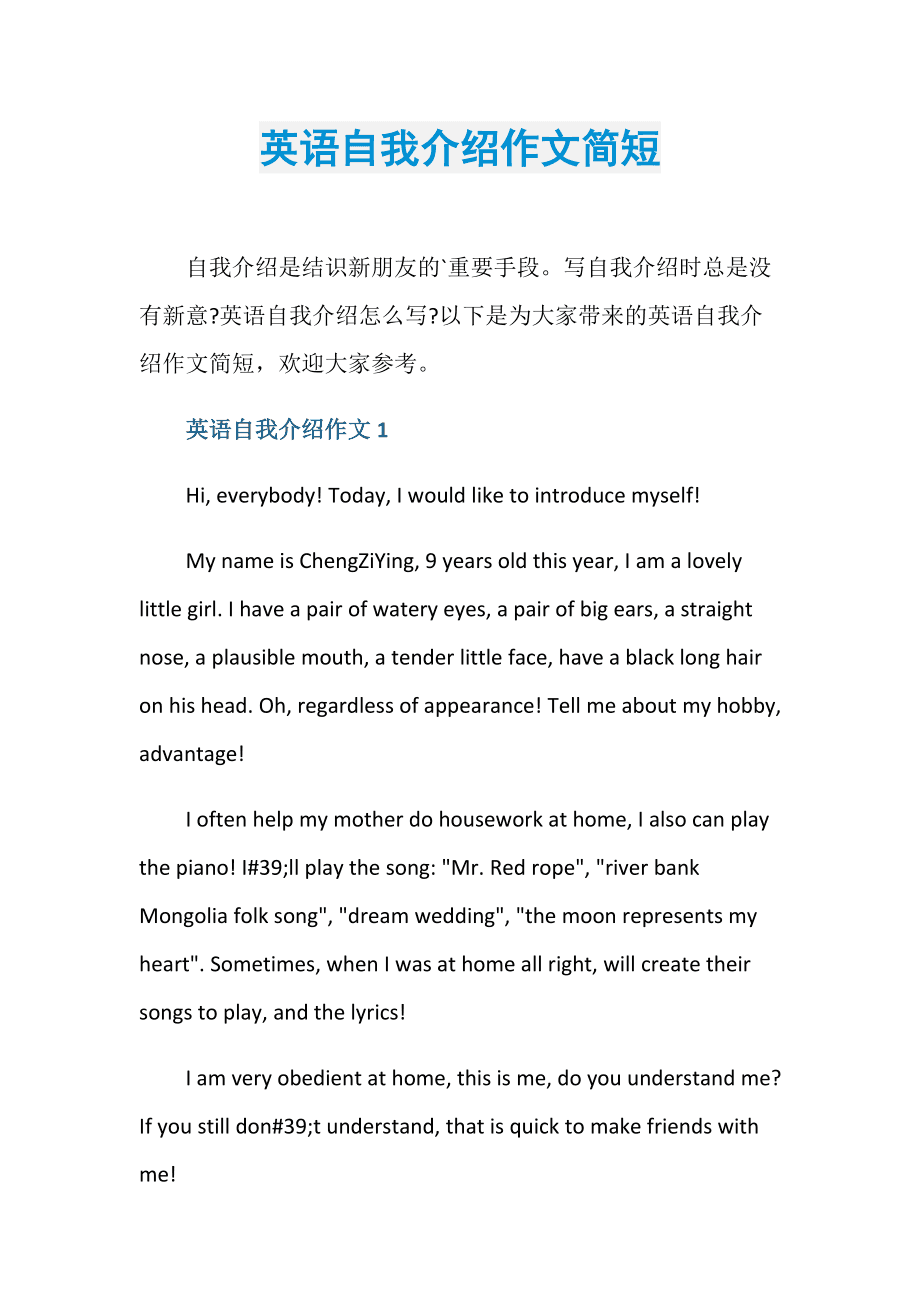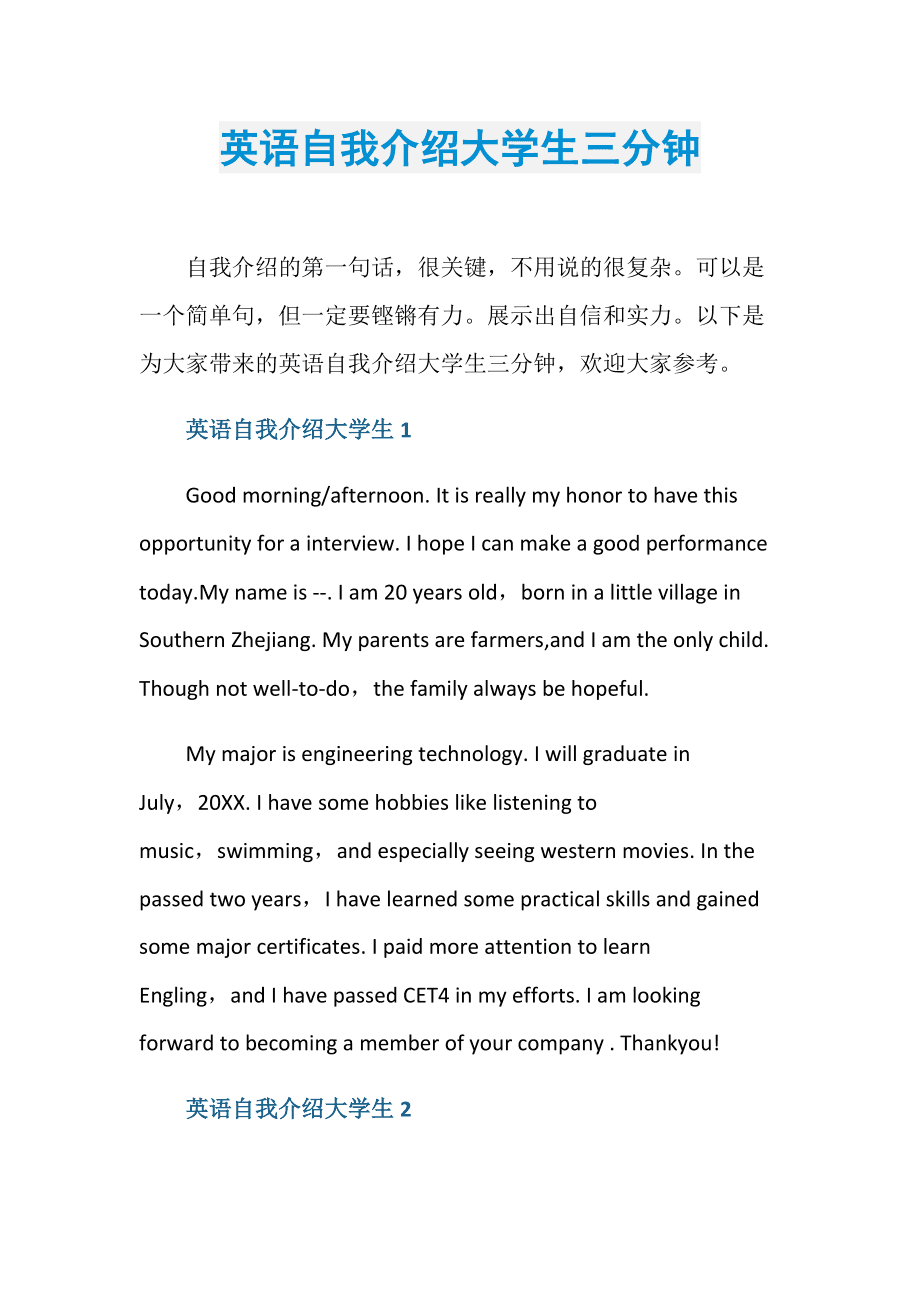
学数理化,我们都知道,遇到例题,自己先演算,遇到公式,自己先推导,这是最好的学习方法。
语言学习也同理:遇到文章先不要急于读,先抓住话题、大意,想想如果我自己写这篇文章,我会怎么说——试着先写一点,再去阅读。这样的做法,适用于那些熟悉话题的短文阅读。
例如下面这个关于英语学习的话题:
【写作话题设计】
阅读下面一段材料,结合自己的学习体验写一篇文章,注意:
(1)不要逐句翻译;
(2)切勿遗漏内容;
(3)不要使用编号;
(4)字数不限,但不能少于120词。

【提纲】
一、问题
中国人一直在学习英语上花费了很多时间和金钱。
家长们也热衷让他们的孩子从更小就开始学英语。
全球来看,中国人的英语能力水平仍然处于较低水平。
二、案例
刘健从13岁开始学英语。现在30岁,仍然对自己的英语能力不自信。
读英语书籍的时候,仍然需要用字典查单词。
和外国人交谈时,不能流利地说英语,也很不自信。
看不懂英文电影和电视上的英语新闻。
三、原因
教科书只教“生活英语”,如自我介绍、购物和问路等,在国内很少有机会用到。
因为作业负担、网络等影响,中国学生阅读量太少。
良好的母语基础,是学习一门外语的必要条件。
【原文参考】
Language proficiency in China remainsat a low level, despite record investment in school programs.
尽管中国给与了学校项目破纪录的投资,但是中国的语言水平仍然较低。
【学习】remainsat a low level保持低水平
despite介词“尽管有、不顾”,后接名词(词组),有别于though。
Liu Jian started learning English while in middle schoolat age 13. It was a compulsory subject, and he took classes in it every day.
刘健(音)从初中开始学英语,当时13岁。当时这是一门必修课,他每天都会上英语课。
【学习】
while in middle school=while he was in middle school(状语从句中,可省略主语和系动词)
took classes=have classes上课(学生听课);比较:give classes上课(老师授课)
He continued to learn the language in high school and college, until he began amaster's degree program in 2009.
后来他在高中和大学也继续学习英语,直到2009年开始攻读硕士学位。
【学习】
continued to learn =continue learning
master's degree硕士学位
Now,at age 30, he says he is still not confident in his English ability.
现在在30岁的年龄,刘健表示说仍然对自己的英语能力不自信。
【学习】
be confident in sth. 对……感到自信;
如果说缺乏自信,我们还可以说:lack confidence in…; 或be lacking in confidence
"To be honest, I worked very hard when learning the language at school and got satisfactory test scores," said Liu, who works at a State-owned petroleum company.
刘健在一家国有石油公司工作,他说道:“老实说,在学校时我很努力地学习这门语言,并且对考试分数感到很满意。”
【学习】
when learning the language= when I was learning the language(状语从句中,可省略主语和系动词)
注意文章怎么说“得到高分”:got satisfactory test scores(得到令人满意的分数);也可以说was satisfied with my scores。(注意比较satisfactory“令人满意的=satisfying”;satisfied“感到满意的”)
"ButI still need to look up words in dictionaries when I read English books. I can'ts peak fluently and confidently when I have to talk with a native English speaker. And what's more, I sometimes can't understand the English news onTV."
“但是当我读英语书籍的时候,我仍然需要用字典查单词。当我不得不和一个英语母语的人交谈时,我不能流利地说英语,也很不自信。更糟糕的是,我有时看不懂电视上的英语新闻。”
【学习】
look up words in dictionaries“查词典”的正确说法。Look up是“查找(单词)”的意思。不要想当然用作look up dictionaries!
a native English speaker: 说母语的人、母语者
what's more=besides;furthermore;in addition;moreover;也可以说what's worse更糟的是。
Liu's feelings are typical for people of his age. In the sixth English Proficiency Index, recently published by Swedish education company Education First, China ranked 39th out of 72 countries and regions.
刘健的感觉对他那个时代的人来说很典型。最近瑞典一家教育公司EducationFirst出版了第六版《英语能力指标》,在全部72个国家和地区中,中国只排在第39位。
【学习】
people of his age:他的同龄人、与他同时代的人
recently published by Swedish education companyEducation First, 这是一个分词词组,做the sixth English Proficiency Index的定语
ranked 39th out of 72 countries and regions:动词rank“排名”
The level of English proficiency among Chinese remains at a low level globally and lags behind a number of other Asian countries such as South Korea and Japan , according to the report.
据这份报告显示,从全球来看,中国人的英语能力水平仍然处于较低水平,而且还落后于诸如韩国、日本等一些亚洲国家。
【学习】
lags behind=falls behind落后于
a number of:只用于可数名词复数前,相当于many“许多”
Despite China 's low ranking in the Education First report, Chinese have historically spent a lot of time and money on learning.
尽管中国在EducationFirst的报告中排名很低,但是中国人一直在学习英语上花费了很多时间和金钱。
【学习】
spent a lot of time and money on learning:我们表达“(某人)花了多少时间或金钱在某件事上”,用spend (time/money)+ on sth.或in doing sth.(本句learning是作为名词)

反过来,我们说:
(某事)花了某人多少钱,则:(sth.)cost sb. (money)
(某事)花了某人多少时间,则:It takes sb. (time) to do sth.
A report by Shenzhen-based consultancy CIConsultingshowed that with almost one-fourth of its population learning the language, China is the world's largest market for English education.
据深圳咨询公司CIConsulting的一份报告显示,中国大约四分之一的人口在学习英语,中国是全世界最大的英语教育市场。
【学习】
with almost one-fourth of its population learning the language
这是一个典型的“with + 宾语名词+ 分词”结构。它的作用相当于一个从句,可以表示一个伴随的事件(随着……同时做某事)、也可以是方式、原因等(在……的情况下)。
例如:With so many kids making noises around me, I couldn't hear what you are talking about.(这么多孩子在我身边吵吵闹闹,我根本听不清你在说什么。)
The report said Chinese people spent 30 billion yuan ($4.3 billion) learning English in 2013, a figure it projected would increase by 15 percent each year.
报告指出2013年中国人在英语学习上花费了300亿人民币(约合43亿美元),而这一数字还将以每年15%的速度增长。
【学习】
a figure it projected would increase by 15percent each year.
首先,名词a figure是前面30 billion yuan的同位语;接下来这个it projected would increase by 15 percent each year.则是其定语从句,省略了关系代词that。it projected(预计)则是一个插入句,还原该句:
The report said Chinese people spent 30 billion yuan($4.3 billion) learning English in 2013, a figure that, it projected,would increase by 15 percent each year.
分隔式定语从句“先行词,同位语名词(关系词)插入句+ 定语从句”这个结构,在近几年高考及模拟卷中出现较多。例如下面几个句子:
Childhood memories which I thought had faded now came back fresh.
When Fleming returned from the war, he began searching for the chemical he believed could treat infections.
I refer to the small town,just the one where, you know, I used to work for years.
用表格断句:
先行词,
同位语名词
关系词
插入语
定语从句
Childhood memories
which
I thought
had faded now
came back fresh.
he began searching for
the chemical
省略
that
he believed
could treat infections.
I refer to
the small town,
just the one
where
you know,
I used to work for years.
A series of regulations released in 2001 by the Education Ministry called on the nation's primary schools to start teaching English in the third grade. That is earlier than Liu and his peers began learning, but in reality, many schools in first-tier cities such as Beijing begin English courses even earlier, from the first grade.
2001年教育部发布的一系列规章制度号召全国小学从三年级开始英语教学。那要比刘健和他的同龄人开始学习英语时早得多,但是事实上,诸如北京等一线城市的许多学校的英语课程要开始得更早,从一年级开始。
【学习】
released in 2001 by the Education Ministry分词定语,修饰A series of regulations
Parents are also keen on having their children learn beginning at younger ages.
家长们也热衷让他们的孩子从更小就开始学英语。
【学习】
be keen on喜欢、热衷于(某事)
Asurvey by First Leap, an English-language education institute for Chinese children aged 2 to 15, showed 88 percent of parents choose to send their children to study English before age 5, because of the belief that children are better at picking up languages between 3 and 5 years old.
据一家专为中国2到15岁儿童服务的英语语言教育机构“励步(FirstLeap)”的调查显示,88%的父母选择在孩子5岁前送他们去学习英语,因为他们相信孩子在3到5岁的时候学习语言的能力更强。
【学习】
because of the belief that =because they believe that
Why,then, has China had such seemingly low returns on its investments? It is a question Chinese educators have pondered for years.
那么,为什么中国给与了这么大的投资但是回报却很低呢?这是一个中国教育者们多年以来一直在思考的问题。
【学习】
low returns on its investments相对于投资的低回报
Han Baocheng, an English professor at Beijing Foreign Studies University, who is also deputydirector of the National Research Centerfor Foreign Language Education, has called for a closer look at the textbooks and teaching materials used in schools.
英语教授、国家外语教育研究中心副主任韩宝成(音)呼吁对学校使用的教材和教学材料进行更仔细地考察。
【学习】
call for:要求、提倡
call on:拜访(人);号召
call at:拜访(地)
call up:打电话给
call off:取消
He said most textbooks teach only "survival English", such as introductions, shopping and asking for directions, which are useful forstudying abroad.
据他表示,大多数教科书都只教“生存英语”,例如自我介绍、购物和问路等,这些东西对留学有用。
Butfor students in China who seldom have the opportunity to practice such English in their daily life,this content is impractical, according to Han.
但是据韩宝成表示说,对于那些很少有机会在日常生活中使用这些英语的中国学生来说,这些内容不切实际。
标签: #英语自我介绍20句








